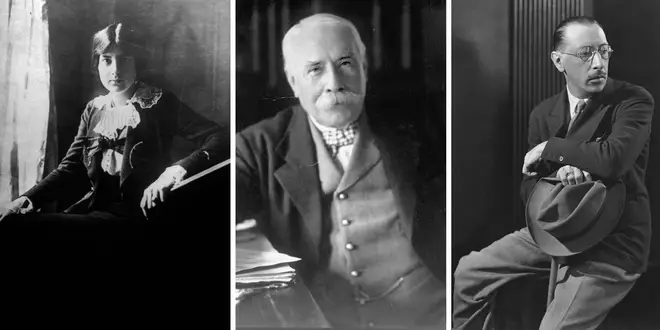10 of the best 20th-century composers
1 December 2020, 10:58

We introduce the 1900s greats and their world-changing music – from Igor Stravinsky to Philip Glass…
Once the century turned, music transitioned from the grand, symphonic Romanticism of Brahms, Mahler and Wagner, and started to break from its traditional harmonic and structural systems, and boundary-pushing genres like serialism, aleatoric music and minimalism started to emerge.
Composers explored the phenomena of their time – from the psychoanalysis of Sigmund Freud to the world wars that shook everything – and created powerful pieces of music that kept up with the fast pace of change that characterised the 20th century.
Here are ten of the greatest composers who navigated all of this, and crafted it into their music in the most masterly ways.
Read more: the 20th century and beyond >
-
Edward Elgar (1857–1934)
Elgar brought us the Enigma Variations, the Pomp and Circumstance Marches, and a cello concerto to end all cello concertos. The English pastoralist cemented the “English” symphonic sound, his pieces reflecting the mood and patriotism of the nation, in many ways, with sounds and emotions of pre-war Britain audible in contrast to those following the First World War.

Elgar's Nimrod – Carducci Quartet
-
Ralph Vaughan Williams (1872–1958)
Another English pastoralist, Vaughan Williams composed the enduringly beloved The Lark Ascending – No.1 in the Classic FM Hall of Fame again in 2020 – and great, sweeping orchestral works like Fantasia on a Theme of Thomas Tallis, and A London Symphony. He studied at the Royal College of Music alongside Gustav Holst, then for three years at Trinity College, Cambridge, where he was a pupil of Hubert Parry, Charles Wood and Charles Stanford. In the end he wrote nine symphonies, six operas, a ballet, hymn tunes and stage works, and film scores.

Jennifer Pike performs The Lark Ascending by Vaughan Willams
-
Igor Stravinsky (1882-1971)
Stravinsky changed the musical world. The masterpieces he wrote revolutionised 20th-century music and spanned all genres, from orchestral to choral, and opera to ballet. His ballets, including The Rite of Spring, The Firebird and Petruska, especially, have cemented Stravinsky as one of the most important composers of the 20th century.

Igor Stravinsky meets the Teletubbies in incredible mashup of 'The Rite of Spring'
-
Lili Boulanger (1893-1918)
In her short life, the great Lili Boulanger proved herself nothing short of phenomenal – even outside the confines of what was expected of her sex in the days she was composing. She had perfect pitch, so pursued music naturally from a young age, and at just 19 she won the prestigious Prix de Rome composition prize for her piece Faust et Hélène – becoming the first woman ever to do so. Her sister was Nadia Boulanger, the Paris Conservatoire don who taught the greatest composers of the 20th century – including Aaron Copland and Philip Glass (see below).
Read more: Meet Nadia Boulanger, the inspiring woman behind the 20th century’s greatest composers >

Lili Boulanger Nocturne pour violon et piano (1911), Savitri Grier (violin), Richard Uttley (piano)
-
William Grant Still (1895-1978)
William Grant Still’s Symphony No. 1 was the most-performed symphony in America for a long, long time. Still was a prolific composer who wrote over 200 works in the end, including five symphonies, four ballets, nine operas and over thirty choral works, and he was a man of many firsts – the first American composer to have an opera performed by New York City Opera, and the first African American composer to have an opera performed by a major company; the first African American to have a symphony performed by a major US orchestra; and the first Black conductor to lead a major US orchestra in concert.
Read more: How William Grant Still changed American classical music forever >

SOUND/STAGE: William Grant Still's "Sorrow"
-
Dmitri Shostakovich (1906–1975)
Russian great Shostakovich wrote 15 symphonies, umpteen operas and ballets, scores of film soundtracks, and numerous instrumental and orchestral works. His career was defined by soviet favour – the Symphony No. 5 was held up as a Stalinist triumph – and then fallout, when he was denounced as decadent and non-patriotic. He endures as one of the most popular composers from the 20th century, with works like The Second Waltz and The Gadfly remaining concert hall favourites.
Read more: Giant tap-dancing noses star in this wonderful opera >

ThatCelloGuy performs Shostakovich's 'Piano Quintet'
-
Benjamin Britten (1913-1976)
Britten’s War Requiem, premiered in 1962 to celebrate the opening of the new Coventry Cathedral, defined the English composer’s career and is at the pinnacle of composers’ responses to the pain and tragedy of war. Britten also revolutionised opera, his works Peter Grimes and The Turn of the Screw defining the genre in the 20th century.
Read more: 15 great composers who also happened to be gay >

Hélène Clément plays Britten on Britten's own viola
-
Leonard Bernstein (1918-1990)
American composer Bernstein brought us as many orchestral concert hall bangers as he did sensational music for musicals and films. His best-known pieces include the genre-defining musicals West Side Story and Candide, and the Chichester Psalms. And many composers conduct, of course, but it’s worth saying that Bernstein sticks out in music history as being as equally revered a conductor as he was a composer. He also took classical music to the masses between the years 1958 and 1972, through 53 televised Young People’s Concerts which introduced an entire TV-watching generation of Americans to classical music – something that gave him four well-deserved Emmy awards.
Read more: Bradley Cooper’s Leonard Bernstein biopic is coming to Netflix >

West Side Story (1961) – Official Trailer
-
John Williams (1932-present)
Film composer extraordinaire John Williams is responsible for music that has formed part of our most beloved on-screen memories – from bicycles flying in E.T. The Extra-Terrestrial and dinosaurs stomping in Jurassic Park, to broomsticks swerving and snitches flitting in Harry Potter. Film scoring is the real culmination of everything that’s affecting and emotive in 19th- and 20th-century music, and John Williams is the real culmination of film music as we know it today.

John Williams conducts the Vienna Philharmonic in the 'Imperial March'
-
Philip Glass (1937-present)
Minimalist master, Philip Glass, has introduced audiences the world over to a whole new genre of music and way of listening. Works like Glass’s Violin Concerto demonstrate the peak of orchestral accomplishment – but within the fragmented, repetitive structures of minimalism – and his scores for films like The Hours and Notes on a Scandal remain some of the most lauded and well-loved in the genre.
Read more: What is minimalism? >

Philip Glass Violin Concerto Movement II
No list is exhaustive – and this one least of all. What about Gershwin? He was unspeakably important, having given us Rhapsody in Blue and An American in Paris, as well as the crucial opera, Porgy and Bess.
Read more: 10 of the best Romantic composers in classical music history >
And there was also Prokofiev, whose ballet Romeo and Juliet, and orchestral works Peter and the Wolf and ‘Classical’ Symphony are some of the most important to emerge from the 20th century.
And Cage and Schoenberg and Stockhausen; John Tavener and Kaija Saariaho and Arvo Pärt... it really is an infinite list. Find out more about these brilliant composers by clicking on their names above.






















